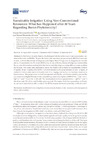Please use this identifier to cite or link to this item:
https://accedacris.ulpgc.es/jspui/handle/10553/58896
| Title: | Sustainable Irrigation Using Non-Conventional Resources: What has Happened after 30 Years Regarding Boron Phytotoxicity? | Authors: | Mendoza Grimón, Vanessa Reyes Fernández Vera,Juan Ramón Hernandez Moreno,Jose Manuel Palacios Díaz, María del Pino |
UNESCO Clasification: | 3103 Agronomía 330810 Tecnología de aguas residuales |
Keywords: | Irrigation Reverse osmosis Banana Water resources Desalinated water, et al |
Issue Date: | 2019 | Project: | Reutilización de Aguas Residuales Para El Desarrollo Sostenible: Producción Forrajera y Bioenergética Adaptación al cambio climático en la Macaronesia a través del uso eficiente del agua y su reutilización ItemCrisRefDisplayStrategy.project.deleted.icon |
Journal: | Water (Switzerland) | Abstract: | In the Canary Islands, there is a hydrological imbalance between water consumption and renewable water availability. To provide more water resources, reverse osmosis (RO) from seawater is used. As boron (B) contents in irrigation water higher than 0.7 mg/L may be dangerous for sensible plants, B concentration in RO water (ROW) may be one of the key factors of irrigation sustainability. Some orchards have been studied after they have used drip irrigation using different water qualities for 30 years. B in water, soils, and banana leaves was determined to check the sustainability of ROW irrigation. When irrigating with ROW, in which B concentration varies between 1.0 and 1.4 mgB/L, B content in banana soils seems to be stabilized at 5-7 mg/kg, and no toxicity has been observed in banana leaves. The proper water and soil management used by the local farmers probably prevent the accumulation of higher B levels in soils. Considering water consumption of 9000 m(3).ha(-1).year(-1), 8-11 kgB.ha(-1).year(-1) is applied to the soil. The banana plant removes approximately 1 kgB.ha(-1).year(-1); therefore, only 10% of the total B added gets exported. This raises the following question: is it better to use membranes that are able to reduce B in ROW, increase the leaching fraction, or blend water? | URI: | https://accedacris.ulpgc.es/handle/10553/58896 | ISSN: | 2073-4441 | DOI: | 10.3390/w11091952 | Source: | Water [ISSN 2073-4441],v. 11 (9), 1952 |
| Appears in Collections: | Artículos |
SCOPUSTM
Citations
20
checked on Jun 8, 2025
WEB OF SCIENCETM
Citations
21
checked on Feb 15, 2026
Page view(s)
330
checked on Jan 15, 2026
Download(s)
172
checked on Jan 15, 2026
Google ScholarTM
Check
Altmetric
Share
Export metadata
Items in accedaCRIS are protected by copyright, with all rights reserved, unless otherwise indicated.
